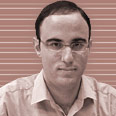
Roee Nahmias
Photo: Gabi Menashe
If anyone still had any doubt that there is no longer an “anti-Syrian camp” in Lebanon, there came Walid Jumblatt and provided the final nail in the coffin. In an interview to al-Jazeera, which symbolically enough was held on the eve of March 14 – the political code of this camp – Jumblatt apologized to Bashar Assad.
"I said, at a moment of anger, what is improper and illogical against President Bashar Assad. It was a moment of ultimate internal tension and division in Lebanon,” Jumblatt said, hoping to “open a new page” via the interviewer, known for his connections with Hezbollah; that is, Jumblatt was hoping that the Syrian president will invite him to the presidential palace in Damascus.
To Jumblatt’s credit, we must note that he was not the first one: Before him, the prime minister and head of the anti-Syrian camp, Sa’ad al-Hariri, headed to Damascus – the same Hariri who held Assad responsible for the assassination of Hariri Sr. in 2005. Following the handshakes and kisses traded with the Syrian top brass, Hariri is reportedly planning to visit Tehran soon, but not the United States. And if this what the head of the anti-Syrian camp does, why should Jumblatt conduct himself any differently?
Yet Jumblatt did not make do with the public apology, and granted his own forgiveness. During the interview, and unbelievably so, he forgave the assassination of his father, Kamal, in March 1977 – three days before the anniversary of his death.
“Following Kamal Jumblatt’s departure, and for the sake of the national and Arab relationship between Lebanon and Syria, I went to President Hafez Assad 40 days later and shook his hand…I said in the past that I’m forgiving but not forgetting – today I say that I’m both forgiving and forgetting. I do not wish to bequeath hostility and hatred to the next generations in leading this house,” Jumblatt said.
Name of the game is survival
These remarks came on top of a series of political zigzags and flic flacs among different camps: One time Jumblatt comes out against the Syrians, another time he urges supporters to vote for Hezbollah, and yet another time he reassumes a neutral posture.
“He has well honed antenna and knows who the strong side is and when to join forces, and therefore he survives,” a Lebanese source once told the undersigned. Survival is apparently the name of the game in Lebanon – and in the absence of firm American and French backing, it appears that both leaders have decided, in their own interest, that they would be better off to reconcile with Damascus at this time, if they wish to stay alive rather than end their lives the way their fathers did.
So what is left of the March 14 camp, five years after it was formed, called for the heads of the Hariri assassins, and filled Beirut’s “Martyrs’ Square” demanding a Syrian withdrawal from Lebanon? Not much. Upon the evaporation of the anti-Syrian glue, and following the departure of George W. Bush and Jacque Chirac, no significant supporters remain domestically or abroad – despite the clear victory in the elections held last June.
Meanwhile, President Assad can comfortably sit back at his chair: His rivals have surrendered before the cameras, while he is regaining a position of influence in Lebanon and also enjoying a tightening alliance with Iran. And so, after five years of struggling and international isolation, the Syrian president is back on his feet, without paying any real price. Moreover, a new American ambassador is already en route to Damascus.















